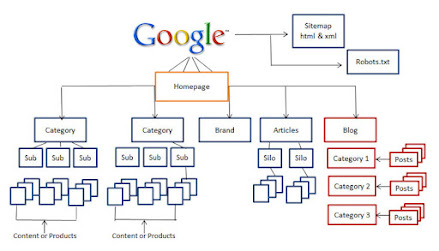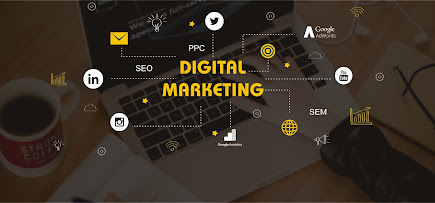Unlocking the Secrets of SEO: Tips and Tricks for Higher Rankings!
Search Engine Optimization (SEO) is a process of optimizing a website to rank higher in search engine results pages (SERPs) for specific keywords and phrases. SEO is an essential digital marketing strategy that can help businesses increase their online visibility, drive more organic traffic to their website, and generate more leads and sales.
SEO involves a
combination of on-page optimization, off-page optimization, and technical
optimization to help search engines understand and rank your website for relevant
keywords. In this article, we'll dive into the details of each type of
optimization and provide some tips for optimizing your website for SEO.
- On-Page Optimization:
- Keyword research:
Researching and selecting the right keywords for your business is critical for effective SEO. It's essential to choose keywords that are relevant to your business and have a high search volume but low competition. - Title tags:
Title tags are HTML elements that provide a brief and concise description of the content of a page. They appear in the SERPs as clickable headlines and are a crucial element of on-page optimization. Including relevant keywords in your title tags can help improve your ranking in the SERPs.
- Meta descriptions:
Meta descriptions are HTML elements that provide a brief summary of a page's content. They appear under the title tag in the SERPs and are a great opportunity to entice users to click through to your website. Including relevant keywords in your meta descriptions can help improve your ranking in the SERPs. - Headers:
Headers are HTML elements that break up the content of a page into sections. They provide structure and hierarchy to the page and are essential for both users and search engines. Including relevant keywords in your headers can help improve your ranking in the SERPs.
- Content:
The content on your website should be high-quality, informative, and relevant to your business. It should also include relevant keywords and be optimized for readability and user engagement. - Images:
Images are an essential element of on-page optimization. They should be optimized for size, format, and alt tags. Alt tags are HTML elements that provide a text description of the image and are essential for users who use screen readers to navigate the web.
2. Off-Page Optimization:-
Off-page optimization refers to the optimization of factors outside
of your website that can affect your ranking in the SERPs. Off-page
optimization includes the following elements:
Backlinks:
Backlinks are links from other websites that point to your website. They are a
crucial element of off-page optimization and can help improve your ranking in
the SERPs. However, it's important to note that not all backlinks are created
equal. High-quality backlinks from authoritative websites are more valuable
than low-quality backlinks from spammy websites.
Social media:
Social media is another important element of off-page optimization. Social
media signals can indicate the relevance and popularity of your website and can
influence your ranking in the SERPs.
Online directories:
Online directories are websites that list businesses and their contact
information. Listing your business in online directories can help improve your
local SEO and increase your visibility in the SERPs.
Technical
Optimization:-
Technical optimization refers to the optimization of the technical
elements of your website to make it more search engine friendly. Technical
optimization includes the following elements:
- Site speed: Site speed is an essential element of technical optimization. A fast-loading website can improve user experience and increase your ranking in the SERPs.
Mobile
responsiveness:
Mobile responsiveness is another crucial element of technical
optimization. With the increasing use of mobile devices to access the internet,
it's essential to have a website that is optimized for mobile devices.
URL structure:
URL
structure is an essential element of technical optimization. A well-structured
URL can help search engines understand the content of your website and improve
your ranking in the Search Engine Result Pages.
Site architecture:
Site architecture refers to the
organization of your website's pages and content. A well-organized website can
improve user experience and make it easier for search engines to crawl and
index your website.
Schema markup:
Schema markup is a type of code that helps
search engines understand the content of your website. It can improve your
ranking in the SERPs and enhance the appearance of your website in the search
results.
SEO Best Practices
Now that we've covered the different types of optimizations,
let's take a look at some best practices for optimizing your website for SEO:
- Conduct keyword research to identify relevant keywords for your business.
- Optimize your title tags, meta descriptions, headers, and content for relevant keywords.
- Use high-quality images and optimize them with alt tags.
- Build high-quality backlinks from authoritative websites.
- Engage with your audience on social media to improve your social media signals.
- List your business in relevant online directories.
- Ensure your website is fast-loading and mobile-responsive.
- Use a well-structured URL and site architecture.
- Implement schema markup to improve your ranking in the SERPs
Conclusion
SEO is a complex and ongoing process that requires a
combination of on-page optimization, off-page optimization, and technical
optimization to improve your ranking in the SERPs. By implementing best
practices for each type of optimization, you can increase your online
visibility, drive more organic traffic to your website, and generate more leads
and sales for your business. Remember, SEO is a long-term strategy, and it
takes time and effort to see results. But by staying consistent and following
best practices, you can achieve success with SEO.
Every one is not perfect, doubt is a key towards understanding the subject. If you have any doubt then comment section is open for every one feel free to ask!
Will be meeting you all in next topic! till then Good buy and Take care!
Are you really interested to make your Product/Service as Brand?
Contact us: +91 80192 42256
Send us your query at: marketing@atticinfo.com
Visit us: https://atticinfo.com/
#atticinfomatics #digitalmarketing #branding #leadgeneration #leadgenerationstrategy #BESTRETURN #returnoninvestmentdeals #digitaltransformation #websitedevelopment #mobileappdevelopment #Chaitanyapuri #Dilsukhnagar #Gachibowli #hyderabad #Telangana #india


.png)
.png)
.jpg)

.png)
.png)

.png)
.png)
.jpg)
.jpg)
.jpg)
.png)



Comments
Post a Comment